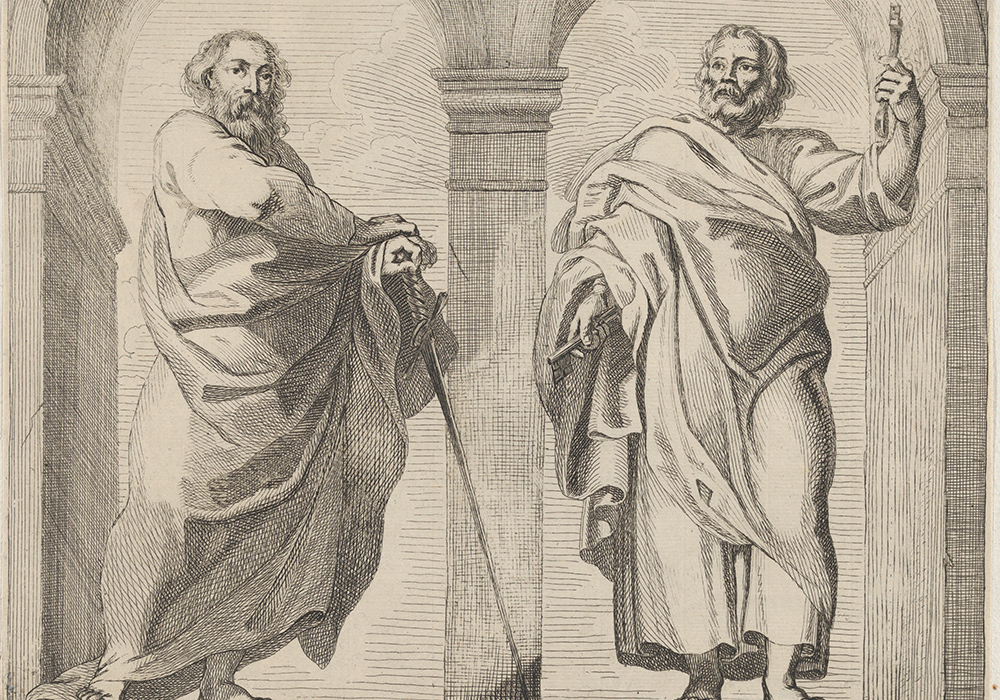
"Saints Peter and Paul in a vestibule," etching by Rombout Eynhoudts after Peter Paul Rubens, circa 1630-80 (Metropolitan Museum of Art)
The Catholic Church teaches us that Sts. Peter and Paul are the two key pillars of the church, and we celebrate their feast on June 29 every year. The lives of these saints have had a great impact on my life.
Whenever I think of St. Peter, I remember the words of my father, who is a fisherman himself. My father would proudly say that Jesus called the fishermen first, and they followed him instantly.
The word "pillar/pilar" reminds me of Our Lady of the Pillar (Nuestra Señora del Pilar), the patroness of Spain. The tradition says that our Blessed Mother appeared between two pillars to St. James the Greater when he wanted to escape the Moors, and she strengthened him to remain faithful to his mission.
And I thought of that again when I read the lives of Sts. Peter and Paul, the two pillars of the church. They both were extremely different in character and formation, but stood united because of Jesus, their master, and remained committed to the good news.
For me, the love of these two saints for Jesus is awesome, inspirational and exemplary.
The life of fisher folk is challenging as they must fight between life and death, and their faith is strong as a rock. The rock can also be symbolic of their character as disciples of Christ.
St. Peter — an uneducated fisherman — was firm in his character. As soon as Jesus called him, he left everything to follow Jesus; St. Peter was aware of his iniquities, but his love for Jesus dominated him. This man's nature and attitude indicate that the godly nature of a man is greater than his weakest nature.
He was the first to recognize Jesus as God's Son when other apostles remained silent. Simon Peter declared, "You are the Messiah, the Son of the living God (Matthew 16:16)." Peter was valiant in his dealings with Jesus; he was never afraid of telling the truth. He might be weak in his body, but his spirit was always willing to do what Jesus did.
He always enjoyed Jesus' companionship. He was one of the few apostles whom Jesus chose to be with him in the important moments of his life. In Jesus' healing of Peter's mother-in-law, we see the closeness of Jesus and Peter himself.
Sometimes overbold, Peter declared, "Though all may have their faith in you shaken, mine will never be," and Jesus lovingly corrected him: "Amen, I say to you, this very night before the cock crows, you will deny me three times (Matthew 26:33-34)." Though Peter was shattered to hear this from Jesus, he was sure that he would not deny him.
The cross that was so heavy for Peter to carry was the fact that he had denied the person whom he loved the most. But when Jesus said to Simon Peter, "Simon, son of John, do you love me more than these?" He did not hesitate to say to him, "Yes, Lord, you know that I love you (John 21:15-17)." And I think his love canceled out that denial! His affirmation of love made Jesus choose him to be the rock of the Catholic Church.
The life of St. Peter was full of promises and affirmations to Jesus, and his acceptance of his mission as the shepherd of the flock. He remained humble whenever he was faced with difficulties. His wish was always to do the will of God.
Advertisement
The life of St. Paul reminds me of the prodigal son. Paul was ignorant of Jesus, though he was a scribe well versed in the law of Moses. His arrogance made him persecute the people of the newfound faith. But encountering Jesus changed his life completely.
His faithfulness to Jesus made him cross mountains and seas. He emptied himself of his wealth, knowledge, fame and position. Though as a Roman citizen he was free, he said:
Although I am free in regard to all, I have made myself a slave to all so as to win over as many as possible. To the Jews I became like a Jew to win over Jews; to those under the law I became like one under the law — though I myself am not under the law — to win over those under the law. To those outside the law I became like one outside the law — though I am not outside God’s law but within the law of Christ — to win over those outside the law. To the weak I became weak, to win over the weak. I have become all things to all, to save at least some (1 Corinthians 9:19–23).
His firmness of character and self-emptying love made him the other pillar of the Catholic Church.
What does it mean for me to be a pillar of the church — of the people's faith? What does it mean for me to be the pillar of my religious life? To be a pillar of something, we need to let go of ourselves.
Sometimes in my religious life — as a religious — I do not want to get hurt. My community wants to be recognized by the church and by the people of God. I want everyone to respect me because I offered myself to become all for all.
But the lives of these two pillars of the church teach me to carry my cross for Jesus. Though Jesus is the king of the universe, he emptied himself and became a savior.
Sts. Peter and Paul did not worry about their fame and position. They dedicated themselves to service in the church and to God, with grit and commitment.
To be a pillar of the Catholic Church, what is my role today as a religious or a member of the church? Taking a cue from Sts. Peter and Paul, I should always deny myself. I do not want fame, power, recognition or wealth. But God alone must be enough for me.
I take courage from the words of St. Teresa of Avila, "Let nothing disturb you. Let nothing frighten you. … They who have God lack nothing. God alone is enough."
Pillars can't be hidden. Let us be the pillars of the church in society, the community, and for others — especially those others who are marginalized — with grit and God's grace. It is a divine responsibility and baptismal commitment to make those of us who are working as invisible pillars into visible ones. Let Our Lady of the Pillar strengthen and guide us to be the strongest pillars of the church, like Sts. Peter and Paul, in the present, fast-changing world.







